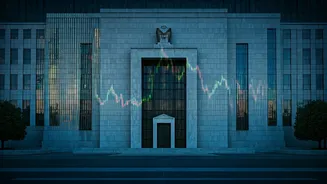Market's Turbulent Waters
The stock market is currently showing signs of instability, with futures indicating a continuation of losses. These fluctuations are partially driven by
investors' worries that the growth valuations of artificial intelligence (AI) related companies may be inflated, thus creating an 'AI bubble'. Similar historical occurrences demonstrate how quickly such sectors can lose value. This has led to a cautious approach among traders and investors, influencing trading behaviors. Investors are responding cautiously to signs of market uncertainty, demonstrating how easily sentiment can shift in the fast-paced world of stock trading, and the effect is more pronounced due to this sector's quick growth.
AI Sector Concerns
The primary focus for market participants is the artificial intelligence (AI) segment. The rapid expansion and high valuations of AI-focused companies are leading to uneasiness, mirroring past financial bubbles. In scenarios such as these, companies that are not built on solid foundations often struggle when market dynamics shift or the flow of money slows. The underlying concern revolves around whether the current valuations of AI companies are sustainable, or if they are simply being fueled by investor exuberance, rather than concrete earnings or strong future potential. The current market action suggests that many investors are reassessing their AI-related investments, as there are high chances of market corrections.
Fed's Data Scrutiny
Simultaneously, investors are keenly focused on upcoming economic data releases, particularly those that may influence the Federal Reserve's future monetary policy decisions. Key indicators, such as inflation figures and employment data, are being analyzed to understand the central bank's next interest rate decisions. The market's reaction to economic reports can be quite significant, since any indication of persistent inflation or economic instability may prompt the Federal Reserve to maintain or even increase interest rates. Such actions could suppress economic growth and negatively impact the stock market, as higher interest rates make borrowing more expensive for businesses and consumers.
Interest Rate Implications
The interest rate outlook has a direct impact on how investors approach the market. Expectations of rate cuts by the Federal Reserve often boost market sentiment, as lower rates reduce borrowing costs and incentivize investment. Conversely, the anticipation of rate hikes tends to create market jitters, potentially causing a decline in stock valuations. For the present situation, the market is delicately poised, with various stakeholders seeking any clues which will indicate the Federal Reserve’s next step. The market reacts sensitively to any hints regarding the timing and magnitude of future rate adjustments, demonstrating the crucial role of the Federal Reserve in shaping investor sentiment and market direction.
Investor Strategies Evolving
Given the current state of market uncertainty, investors are adopting different strategies. Some are decreasing their risk exposure by selling assets and shifting towards more secure investments. Others are maintaining a wait-and-see attitude, observing market developments before committing any more capital. In the meantime, active investors are considering AI as a potential area for future growth, seeking companies with robust business models and long-term sustainability. These varying approaches reflect an understanding of the complex market dynamics, and how quickly investment strategies can be affected by the changes in the economic environment and investor sentiment. Risk tolerance and investment horizon also guide the choices.














